外研版高中英语必修二英语Module3MusicSectionⅡ
高中英语外研版必修二-Module-3-music.ppt

3. How long were Mozart and Haydn friends?
They were friends for ten years.
Step 3 Intensive reading (Ⅱ) Read paragraph 3、4
and 5 about Mozart and match the time with the
• Beethoven was born in GAeursmtraian.y .( F )
• Beethoven learned to play the violin and
piano from his father ,who was a
T
singer.( )
• Beethoven met Hayden in 17901 . ( F )
FAMOUS PIECES
a person whds in front of a group of musicians or singers and directs their playing or singing.
pianist
《献给爱丽丝》
When he was a teenager
composed many pieces for the harpsichord ,piano and violin
Fast reading (III)
Read the last three paragraphs
1. Who taught Beethoven how to play the piano?
London
Eastern Austria
Fast reading (II) Read paragraphs 3,4,5
外研版必修2Module3Music课件
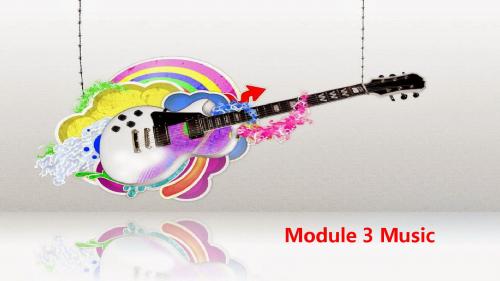
_F_a_m__il_y_ He is the son of a p_e_a_s_a_n_t __.
E_d_u_c_a_ti_o_n He studied m__u_si_c__ in Vienna. _W__o_r_k__ He worked at the court where he becamdeirector
Module Three Music - Jobs
director/ conductor
someone who stands in front of a group of musicians or singers and directs their playing or singing
Module Three Music - Jobs
Three Great Child Composers
Module Three Music
Module Three Music Read Paragraph 1 and 2 to fill in the blanks:
Biography
Joseph Haydn
_B_i_rt_h__ He was born inA_u_s_tr_ia__in__17_3_2___.
choir n.
a group of people who sing together
Module Three Music - Jobs
orchestra n..
a large group of musicians who play a variety of different instruments together
Module Three Music
Expressions for reference:
外研版高中英语必修2 Module 3《Music》(Period 2)ppt课件

本 课 栏 目 开 关
D
. B.guard D.influence
A.advantage
课堂讲练互动
if not 如果不是这样 if any 如果有 if necessary 如果有必要 if possible 如果可能 when(ever) possible 无论什么时候有可能 [语境助记] (1)If (it is) possible,I’ll go to Guilin next week. 如果可能的话,我下周将去桂林。 (2)I will buy a computer if (it is) necessary. 若有必要,我就买一台电脑。
课堂讲练互动
本 课 栏 目 开 关
[题组训练]
(1)—Should I look up each word that I don’t understand? 本 —No,turn to your dictionary only when (it is) necessary . 课 ——我应该查出来我所不理解的每一个字吗? ——不用,必要时再查。
课堂讲练互boy is easy to get along with. 这个男孩很容易相处。 (2)This kind of fish is not fit to eat. 这种鱼不适合吃。 (3)We found English was difficult to learn. 我们觉得英语很难学。
栏 目 开 关
课堂讲练互动
(2)She said she had lost her bike. best to help her. A.If is so C.If so B.If not
C
,we should try our
本 课 栏 目 开 关
外研社高中英语Module3《Music》知识与要点课件_外研版必修2

Module3 music重点词汇及拓展 1.audience n.听众2.tone n.曲调3.musician n.音乐家→music n.音乐→musicaladj.音乐的4.influence vt.影响→influential adj.有影响的poser n.作曲家→compose vt.作曲6.complex adj.复杂的→complexity n.复杂,复杂性7.talent n.天分;天赋;才华→talented adj.天才的8.tour vt.巡回演出→t ourist n.旅游者→tourism n.旅游业重点短语 1.be different from与……不同2.change...into把……变为3.be impressed with给(某人)留下印象4.split up分裂,分割5.make a note of记录6.go deaf 聋了7.of_all_time有史以来8.no_way没门重点句型However,it was Haydn who encouraged Beethoven to move to Vienna.然而,正是海顿鼓励贝多芬移居维也纳的。
重点单词1.lose(lost,lost) vt.丢失;失去;错过;迷路;使沉溺于,专心致志于归纳拓展lose face丢面子;丢脸lose heart灰心;泄气lose one’s heart to...爱上/喜欢上……lose one’s way=get/be lost迷路lose weight减肥be lost in=lose oneself in沉迷于;专心致志于(be) lost in thought陷入沉思注意:lose一般用作及物动词,因此如果后面不跟宾语时,应用被动形式,特别是以非谓语动词形式出现时,要注意losing和lost的区别。
他坐在那,沉浸在思考中。
It was darker,what's worse,he was lost in the forest.天越来越黑了,更糟的是,他在森林中迷路了。
外研版高中英语必修2复习课件Module3 MusicPeriod
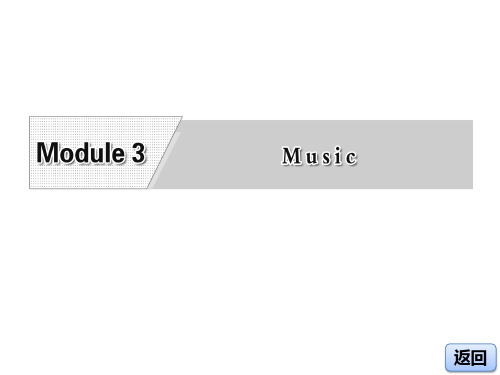
返回
1.Do you like music?What words can you think of?
______________________________________________ ______________________________________________
返回
参考答案:Yes, I do. ①piano; violin; guitar; drum; erhu ②pop music; classical music; rock music ③Beethoven; Mozart; Nie following information with the three composers
A.was very popular in Vienna 1.Haydn
B.is known as “the father of the symphony” C.started composing music when he was very young 2.Mozart D.became completely deaf during the last years of his life
When he graduated from Harvard University in 1976, he was already an internationally renowned cellist.
返回
Although he has never lived in China, Ma says he is fascinated (着迷) with Chinese culture. He recalls his childhood when his parents talked to him about Chinese culture in French.
高中英语 Module 3 Music教师用书 外研版必修2

Module 3 Music音乐可以开启封闭的心灵,纾解忧郁苦闷的心情,甚至还可以起到治疗某些程度的心灵创伤。
When you need comfort,what or who do you go to?For some people,it's a good friend or a familiarplace.For me the most comforting thing in the worldis music.You may be thinking you can't believe inmusic.This is true but you can believe in thefeelings and emotions music gives you.Every weekday is the same for me.I wake up at6:00;I work from when I get there to 3:15 on Mondaysand Wednesdays and 4:15 on Tuesdays and Thursdays.The only thing that keeps me wise all day is music in any form.On days when either the radio got wet from the hose or got dropped or stolen,I have my iPod with me.In between my destinations in my truck I plug my iPod into the tape cassette adapter and play it.When I'm at school,none of my teachers care if we listen to music as long as we don't let it become a distraction,so I have my iPod there,too.Slow songs usually tend to calm people down.When people listen to sad songs they are usually depressed.Sometimes when sports teams like hockey,football teams are getting ready for a game they will play metal or rock music to get them pumped for the game.Some people say that loud or angry music has a horrible influence on teenagers today.Yes,it can be a bad influence but only if you let it influence you negatively.Generally I like to keep an open mind about all types of music.The reason for this is that music is the artists' way of communicating their thoughts or feelings to anyone who will listen and I think they are worth the respect I can give by listening to their music.1.emotion n.情感2.hose n. 水龙带3.destination n. 目的地4.distraction n. 分散注意力的事5.calm sb. down 使某人平静下来6.depressed adj. 沮丧的7.hockey n. 曲棍球8.influence n.& vt. 影响9.negatively adv. 消极地1.What kind of music does the auther like?2.What music will sports teams listen to when they get ready for a game?【答案】 1.The auther likes all types of music.2.They will listen to metal or rock music.Section ⅠIntroduction & Reading and Vocabulary-Preparing根据提示写出下列单词1.n.听众2.n. 古典音乐3.n. 音乐家4.n. 天才5.vt. 失去;丢失6.adj. 音乐的7.n. 天分;天赋;才华8.vt. 作曲;创作9.vt. 巡回演出【答案】 1.audience 2.classical 3.musician4.genius 5.lose 6.musical 7.talent8.compose 9.tour看单词学构词:后缀ian可以表职业,如:musician 音乐家;politician 政治家;还可以表“来自……的人”,如:Asian 亚洲人;Canadian 加拿大人;Indian 印度人等。
外研版必修二Module 3《Music》ppt课件2 (2)

-- Oh, I forgot ________.
A. turning it off B. turn it off
√
C. to turn it off
D. having turned it off
√
Correct
I’d like very much come but I had an examination on Monday morning. (2000 北京) come to come
1. 他努力工作, 为的是要成功。
He worked hard in order to succeed. 2. 我们坐下来吃饭。 We sat down to (in order to/ so as to) have dinner.
√
1. --Mum, why do you always make me eat an egg every day? -- ____ enough protein and nutrition as you are growing up. (1999 上海) A. Eat B. Getting C. To get D. To be getting
2. -- Does your brother intend to study German? -- Yes, he intends ________. (1998上 海) A. B. to C. so D. that
√
3. She pretended ________ me when I passed by.
5. 汤姆很诚实从不说谎。 Tom is so honest a boy that he never tells a lie. ( Tom is such an honest boy that he never tells a lie.)
外研版必修2 Module 3 Music 课件
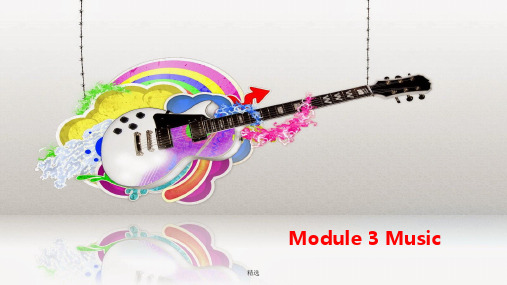
精选
Module Three Music - Instruments
erhu n.
精选
Module Three Music - Instruments
piano n.
精选
Module Three Music - Instruments
violin n.
精选
Module Three Music - Instruments
Austria in 1732
peasant
music
director
symphony
精选
Mozart
1756
musician conductor
family
birth
education four
harpsichord 精选
Austria
composer work
achievement
>600
greatest musical genius
精选
Module Three Music
Summary
01 Basic knowledge of music 02 Biography of three composers 03 Presentation
精选
Module Three Music
Homework
➢ Preview Cultural Corner-Ye Xiaogang ➢ Draw a Mind map of Ye Xiaogang’s
singer n.
someone who sings songs
精选
Module Three Music - Jobs
composer n.
高中英语 Module 3《music》教案 外研版必修2

Module 3 musicAims and requirements●To enable the students to listen and talk about likes and dislikes (especially about music and musicians),encouraging them to try the vocabulary and everyday English in this unit●To develop the students’ reading ability●To help the students learn and use two grammars (adverbial clause of time and the past perfect tense) in different situations●To help the students to write a biography of a person, using the time expressions in Grammar 1Teaching proceduresPeriod 1 Introduction ,Warming upTeaching aims:Enabling the students to1. know some words about music2. know something about three great posersstep1. Warming up by listening pieces of music and asking questionsPlay several pieces of music (music from Haydn, Mozart and Beethoven will be best) to let the students listen and appreciate, then ask them:1) Do you like music?2) What about these pieces?3) What is your favorite kind of music?4) Who is your favorite musician? And who is your favorite poser?step2. Warming up by showing some pictures and discussing1) Do you know who they are?2) What kind of things are these pictures connected with, science, culture, politics, painting, drawing or music?step3. Warming up by listening to a piece of musicGood morning, class. Today we are going to read a passage about three great musicians who are all posers. A poser is a musician who writes pieces of beautiful music forothers to sing or to play. Now,let’s listen to a piece of music.(the teacher playsa piece of music ----er quan yingyue)1.do you know what kind of music it is?2.whose work is it?3.what kind of music is it?4.what is your feeling after listening to it?Step 4 show the following picturesAnd make the students familiar with these new words:Piano violin saxphone drum erhu guitarste p4.now please match these musical instruments with their names.Step 5 work in groups to discuss these questions:1.which of the instruments do you like listening to?2.which famous musicians play them?3.is the chinese instruments different from the other instruments?describe thedifference,if there is one.Step6 summary and homework:Today we’ve learnt the Introduction,know something about music,and we’ve also learnt some new words.The homework:1.Try to instruct your favorite musician to your class orally.2.Learn the new words again, using the dictionary if necessaryPeriods 2 Reading and VocabularyTeaching Aims:Train the students' reading ability.Learn some useful words and expressions.Teaching Important Points.Help the students to understand the passage better.Learn and master some important words and phrases in this period.Teaching Difficult Points:How to help the students improve their reading and understand the passage better. Teaching Methods:Fast reading to get the general idea of the text.Careful reading to understand the passage better.Discussion to help the students understand what they've learned better. Teaching procedure.Step 1 Lead --inThe teacher may play a kind of music written by Beethoven.------- What kind of music do you think it?----- Who do you know wrote it ?The teacher may discuss the questions and answer them freely.T: As we know, there are various kinds of music around the world. They all have their own obvious characteristic. And also there were famous posers such as Joseph Haydn, Mozart, and Beethoven. Today we may learn of their life from the text.Step 2 Reading prehension.Fast reading: Read the passage quickly and choose the best title.A.Three Great Austrian posers.B.Three Great poser of the eighteenth Century.C.Three Great Child posers.Key: B.Now let's read the passage again, underline new words in the text and decide whether the following statements are right or not.1.The three posers were all born in Austria.2.Mozart had a beautiful singing voice.3.Mozart died before his fortieth birthday.4.Beethoven once worked at the court of a prince, who began to go deaf when he grew older.5.Beethoven had ever met Haydn, but he didn't think he taught him a lot.6.Both Haydn and Mozart had fathers who were musicians.Key:1.F Beethoven was born in Bonn, Germany.2.F. Haydn had a good singing voice.3.T4.F. Haydn once worked at the court of a prince, but he didn't go deaf.5.T6.F. Haydn was the son of a peasant( The teacher may begin with the T/F questions orally and this is a good time to test their listening abilities as well as their prehension of the text. )Step 3 Read and listen to the passage. Meanwhile, some more questions are waiting for you.1.How did Haydn change the form of symphonies?2.How long did he work in eastern Austria?3.How many pieces of music did Mozart pose?4.How old was he when he played for the Empress of Austria?5.How long were Mozart and Haydn friends?6.Who taught Beethoven how to play the piano?7.Did he stop posing when he became deaf?Keys:1 He changed the symphony into a long piece for a large orchestra.2. 30 years.3.More than 600 pieces of music.4. When he was 6 , he played the harpsichord in a concert for the Empress of Austria.Periods 3, Function and GrammarTeaching aims:1 To learn grammar rules2 To use the grammar rules for correct munication3 To study co-operatelyTeaching important points: To use the correct tense and the proper conj. Teaching difficult points: To use correctly the two tenses and the three conj. Teaching methods: Explanation and practiceTeaching procedure:Step Ⅰby telling the class what happened to the Shenzhou Ⅻlot in the area of.Shenzhou Ⅻand the whole nation were waiting and I came back home fromschool and heard the news, I couldn’t help getting exciteed. I feelproud of our country.Step Ⅱ Grammar 11 Make sentences with “when , while, e in , have a lesson〞( Here is a picture of a classroom and a student ing in)A When he came in, we were having a lesson.B When we were having a lesson, he came in.C While we were having a lesson, he came in.2 Say the meaning of “as〞 in the following sentences.D As he was a child, he studied drawing.E As he grew older, he began to go deaf.F He listened to music as he walked.当…之时随着一边…一边…3Answer the three questions.When we talk about a single event in the past,we use when as in A .When we talk about a period of time in the past,we use when/ while / asas in B C D.We use as to refer to a progressive change as in E F .4Practiceplete the following sentences with “when ,while , as〞(1) ___she was studying at school, she also sang in the school choir.(2) ___he was living in Vienna, he studied music.(3) ___she met bach,she was only 20 years old.(4) ___he grew older, he found it more difficult to pose music(5) ___he was playing in the orchestra, he met his wife.(6) ___he was working in Hollywood, he became ill and died.(7) ___I listened to the violin solo, I fell in love with classical music.(8) ___they toured Europe for 10 years, they finnally decided to live inAustrilia.Step Ⅲ Grammar 2 The past perfect tense1Read the following sentences and summarise rules, paying attention to tenses. Fill in the blanks.After Liping had finished doing his homework, he turned on the TV.After they had got everything ready, they began to do the experiment.Before he came to our school, he had taught English for several years.Before his letter reached me, I had received his telephone call.They had finished the project by last month.I had left the country by the time the letter reached me.had done before diddid after had donehad done by did/past time2 PracticeWorkbook Grammar (2)(3)(4)plete the sentences using the verbs in brackets and the past simple or past perfect tense.Step Ⅳ1 Game Oral practice ,pair work.Ask and answer questions using all kinds of tenses.Example:-- When did you have your breakfast this morning?-- At 6.-- Have you prepared for the English lesson?-- Yes, I have. I have finished the exercises in the workbook.2 Watch a vedio play.Step Ⅴ Sum upAsk some students to make sentences using “when, while, as, before, after, by〞. Step Ⅵ Homework: Present a biography of a famous Chinese musician or poser.Periods 4 Speaking and WritingTeaching Aims:1.Knowledge and Skilla.To develop speaking ability by talking about likes and dislikes.b.To learn about some vocabulary and knowledge related to music and posers.c.To develop writing ability by presenting a biography of a famous Chinesemusician or poser.d.Train the ability of collecting and dealing with information, and developtheir abilities of getting new information, munication and cooperation.2.Emotion and Valuesa.To raise students’ interests in science and form the right attitude towardsall kinds of music.b.To help them know Chinese traditional music well and cultivate their interestin playing some Chinese instrument.3. Character-building:a.To make them know how to enjoy different kinds of music.b.Arouse their interest of playing some kinds of instrument and enrich theirleisure time.4. Cross-cultural awarenessa.To help them know the difference between China and some western countries ininstruments.b.Cultivate their awareness of cultural munication through the speciallanguage—music.Difficulties and Importance:a.To make the students understand and grasp the vocabulary and knowledge relatedto music.b.To enable the students to know how to use adverbial clause of time. Teaching Method:a.Task-based methodologyb.municative ApproachTeaching Procedures:Step 1 Pre-readingLook at the picture and answer the following questions.1.Who is he?2.Have you ever know something about him?Step 2 While-readinga. SkimmingRead the passage quickly, and make a note of some basic information about Ye xiaogang.Suggested answers:b. Detailed readingRead the passage carefully and fill in the blanks with proper words. Find what Ye Xiaogang did or what happened to him in the following years:Suggested answers:Step 3. Post-readingDiscussion.1.Are there any similarities between Ye Xiaogang and the European posers you haveread about in this module?2.Do you think it is a good idea to mix Chinese and western music?Step 4 Everyday Englisha. Listen to two people talking about the way they listen to music and answer the questions.1.How do they listen to it?2.Are they happy with the way they listen to music?3.What does Anna offer to do for Tom?b. work in pairs. Discuss your favourite music and how you listen to it.Step 4 Guided writingWrite a short passage of a famous singer in China—Han Hong.The following words may help you:1. sing well successful song writer2.born in1971 in Tibet(某某)3. young watch her mother sing and dance4. at the age of nine professional(专业的) training in Beijing.5. in 1985 her first national prize6. write songs in 19937. song Hometown number one in ChinaHomework:1.Finish writing the biography of Han Hong—a famous Chinese singer.2.Finish other exercises in this module.Periods 5 culture cornerTeaching aims:Enabling the students to1. to know sth about Ye Xiaogang2. write a biography of a famous Chinese musician or poser.Teaching steps:I. Ask some students to say something about Mozart.Give as many details as possible. II. Try to think of a Chinese musician or poser, eg. Xu Peidong.Gather these materials.1. when, where and in what kind of family he/ she was born.2. how he/ she spent his/ her childhood or youth.3. about his/ her education4. what are his/ her famous works5. what his/ her style is / wasGroup work. Ask the students to discuss about the musician or poser.Then ask some students to stand up to say sth. about the musician or poser.Correct the mistakes if any.III. Cultural Corner.Ye Xiaogang1. Listen to the passage and try to find the answer to this question:When did his album Horizon appear? (in 1986)2. Read the passage thoroughly and make a note of the information about Ye Xiaogang.Name:_________________ Sex: __________________Nationality:_____________ Job:___________________Main achievements: ____________________________________________Style of music: ____________________________What he did or happened to him in the following years:1955: ___________________________________________From 1978 to 1983: ___________________________________________1985: ___________________________________________1986: ___________________________________________1996: ___________________________________________3. Check the answers with the whole class. Then ask one or two students to say sth about Ye Xiaogang with the help of the notes made.4. Language points:1) work as2) leading modern posers 主要作曲家leading article 社论the leading cause 主要原因a leading role 主角3) mix A with B= mix A and B togethermix win with waterNever mix with such people.mix up 弄混,弄错It’s mon to mix him up with his brother.弄乱mix up the papersmix up those data4) receive many prizes5) part ofIV. Homework:Write a short passage about the Chinese musician or poser we talked about this period.。
module3-music 外研版必修二课文

Part 2
1.How many pieces of music did Mozart compose?
Over 600 pieces of music.
2.How old was he when he learned to
play the harpsichord ?
When he was four
Three Great Austrian Composers Three Great Composers of the Eighteenth Century
Three Great Child Composers
Read part I and answer:
1.What is Haydn known as? He is known as “the father of the symphony”. 2.How did Haydn change the form of symphonies?
1.弹吉他 2.弹钢琴 3.打鼓 4.拉二胡 5.拉小提琴 6.吹萨克斯
musical instruments
Beethoven
composer/musician a person who composes/writes music
conductor/director
Ones who listen to or watch programmes or performances
[bæ nd]
group of people playing popular music
How many types of music do you know?
Folk music
Country music (乡村音乐)
高中英语外研版:必修二 module 3 music 含答案
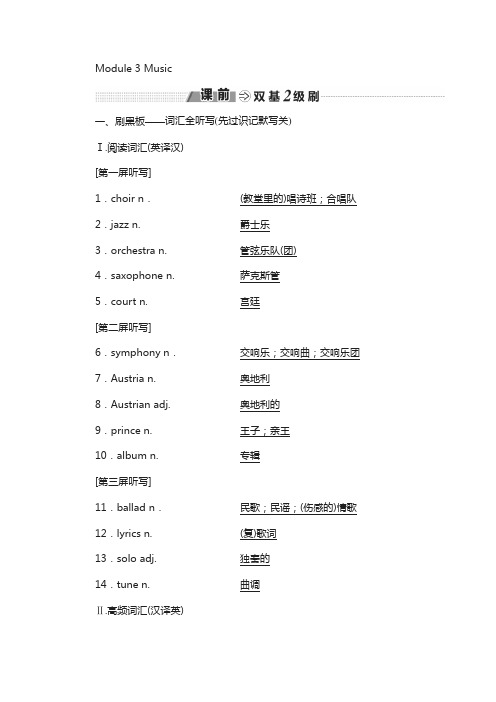
Module 3 Music一、刷黑板——词汇全听写(先过识记默写关)Ⅰ.阅读词汇(英译汉)[第一屏听写]1.choir n.(教堂里的)唱诗班;合唱队2.jazz n. 爵士乐3.orchestra n. 管弦乐队(团) 4.saxophone n. 萨克斯管5.court n. 宫廷[第二屏听写]6.symphony n.交响乐;交响曲;交响乐团7.Austria n. 奥地利8.Austrian adj. 奥地利的9.prince n. 王子;亲王10.album n. 专辑[第三屏听写]11.ballad n.民歌;民谣;(伤感的)情歌12.lyrics n. (复)歌词13.solo adj. 独奏的14.tune n. 曲调Ⅱ.高频词汇(汉译英)[第四屏听写]1.audience n.听众2.classical n. 古典音乐3.composer n. 作曲家4.conductor n. 指挥5.musician n. 音乐家[第五屏听写]6.director n.指挥7.genius n. 天才8.lose vt. 失去;丢失9.musical adj. 音乐的10.peasant n. 农民[第六屏听写]11.talent n.天分;天赋;才华12.compose vt. 作曲;创作13.tour vt. 巡回演出14.band n. 乐队15.catchy adj. 动人的[第七屏听写]16.complex adj. 复杂的17.influence vt. 影响18.record vt. 录音19.lecturer n. (大学的)讲师[第八屏听写]20.mix vt. 使混合21.be_impressed_with 留下深刻印象22.split_up 分裂;分割23.make_a_note_of 记录二、刷清单——热身自盘点(再过基本应用关) (一)核心单词。
高中英语 Module 3 Music教案 外研版必修2
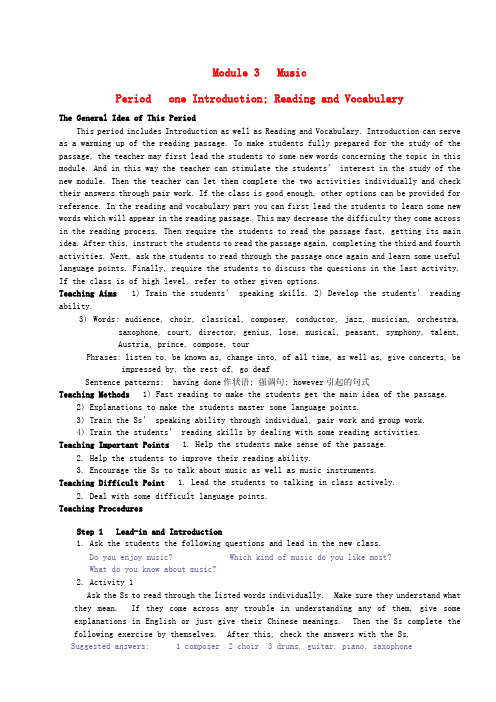
Module 3 MusicPeriod one Introduction; Reading and VocabularyThe General Idea of This PeriodThis period includes Introduction as well as Reading and Vocabulary. Introduction can serve as a warming up of the reading passage. To make students fully prepared for the study of the passage, the teacher may first lead the students to some new words concerning the topic in this module. And in this way the teacher can stimulate the students’ interest in the study of the new module. Then the teacher can let them complete the two activities individually and check their answers through pair work. If the class is good enough, other options can be provided for reference. In the reading and vocabulary part you can first lead the students to learn some new words which will appear in the reading passage. This may decrease the difficulty they come across in the reading process. Then require the students to read the passage fast, getting its main idea. After this, instruct the students to read the passage again, completing the third and fourth activities. Next, ask the students to read through the passage once again and learn some useful language points. Finally, require the students to discuss the questions in the last activity. If the class is of high level, refer to other given options.Teaching Aims 1) Train the students’ speaking skills. 2) Develop the students’ reading ability.3) Words: audience, choir, classical, composer, conductor, jazz, musician, orchestra,saxophone, court, director, genius, lose, musical, peasant, symphony, talent,Austria, prince, compose, tourPhrases: listen to, be known as, change into, of all time, as well as, give concerts, be impressed by, the rest of, go deafSentence patterns: having done作状语; 强调句; however引起的句式Teaching Methods 1) Fast reading to make the students get the main idea of the passage.2) Explanations to make the students master some language points.3) Train the Ss’ speaking ability through individual, pair work and group work.4) Train the students’ reading skills by dealing with some reading activities. Teaching Important Points 1. Help the students make sense of the passage.2. Help the students to improve their reading ability.3. Encourage the Ss to talk about music as well as music instruments.Teaching Difficult Point 1. Lead the students to talking in class actively.2. Deal with some difficult language points.Teaching ProceduresStep 1 Lead-in and Introduction1. Ask the students the following questions and lead in the new class.Do you enjoy music? Which kind of music do you like most?What do you know about music?2. Activity 1Ask the Ss to read through the listed words individually. Make sure they understand what they mean. If they come across any trouble in understanding any of them, give some explanations in English or just give their Chinese meanings. Then the Ss complete the following exercise by themselves. After this, check the answers with the Ss.Suggested answers: 1 composer 2 choir 3 drums, guitar, piano, saxophone4 drums, piano, violin, saxophone5 drums, piano, saxophone, violin6 erhu, drums3. Activity 2The teacher reads out the listed questions and make sure the Ss understand what they all mean. If not, give some necessary explanations. Then the teacher asks the Ss to have a discussion in groups of four. Next, ask some representative groups to report their discussion results. Finally, call back answers from the whole class.Suggested answers:The pictures show (from left to right): violin, classical guitar, drums, saxophone, erhu, piano1-3 Students’ own answers.Step 2 Pre-reading1. Background knowledge of the three composersFirst the teacher shows the following chart on the Bb. and ask the Ss to discuss how much they know about the three world famous composers Haydn, Mozart as well as Beethoven and tell2. Show the following words on the Bb. Have the Ss read them after you and make sure they know what they mean. If they can’t understand any of them, they can turn to you for help or look them up in the reference book, for example, a dictionary.court director genius harpsichord impressed lose musical peasantpiece(of music) singer successful symphony talent teenagerStep 3 While-reading1. SkimmingThe teacher first reads out the listed three titles to the whole class and make sure they can understand them clearly. Then the teacher has the Ss look through the passage quickly to catch the main idea. Next, the Ss complete the second activity and choose the best title. Finally, the teacher calls back the answers from the class.Suggested answers: Three Great Composers of the Eighteenth Century.2. ScanningFirst ask the Ss to look through the four questions in activity 3 on P23 quickly and try to understand them. Then have the Ss read the passage and find out the answers. Finally, call back the answers from the class.Suggested answers: 1)Haydn, Mozart2)Beethoven3)Haydn 4)Mozart5)Beethoven 6)They all met each other. 7)Beethoven, Mozart 8)HaydnAsk the Ss to reread the passage and make the chart shown in Step 2 perfect.3. Careful readingOption 1The students are required to look through the seven questions in activity four on P23 beforereading the passage one more time. Work in pairs to ask and answer them. One reads the listed questions, and the other gives his/her answers. Then exchange their roles and repeat this once again. Finally, check their answers according to what is shown on the screen.Suggested answers:1) He made them longer and for a larger orchestra.2) He worked in eastern Austria for 30 years. 3) He composed over 600 pieces of music.4) He was six years old. 5) They were friends for ten years.6) His father taught him. 7) No, he continued composing when he became deaf.Option 2 (Show the following on the screen.)1) Mozart is famous as “the father of the symphony”. ( )2) Beethoven spent his last years of life in the Austria capital. ( )3) Mozart helped Beethoven move to Vienna. ( )4) Haydn thought highly of Mozart. ( )5) Among the three composers, Haydn was the oldest while Mozart the youngest. ( )First, ask the Ss to read through the sentences above quickly and try to understand them.Then have them read the passage again and decide if these sentences are true (T) or false(F). Next, put the Ss into pairs and compare their answers.Finally, call back the answers from the class.Suggested answers: 1)F 2)T 3)F 4)T 5)FStep 4 Summary and HomeworkThe teacher recalls what the students have learnt in this class. The students mainly learned some new words about music. In addition, they also got some more information about three great composers in the world through the reading activities. Then they settled problems about important and difficult language points. At last, assign the homework to the students—search for more information about the three great composers.Step 5 Related Language Points in This Period1. Is the Chinese instrument different from the other instruments? Describe the difference,if there is one. 中国的乐器与其他的乐器不同吗? 如果有,描述不同点。
Module 3-Music-必修2-外研版-英语

Period One │ 重点难点
重点难点
重点 Ask the students to finish the questionnaire on Page 25 to talk about their likes and dislikes about music in groups. 难点 Enable the students to discuss how to listen to music.
Unit 1 │ 美文欣赏 美文欣赏
What is music? Suppose you hit a woodenIt makes a sound. Now suppose you hit a ball. It makes a sound. The second sound is called a tone (乐音). A tone is a single musical sound. Music is the art of organizing tones into meaningful patterns of sound. We might call it the language of tones. Sometimes the language of music speaks to us in tones sounding after one another in melody (旋律). Or the tones could be sounding together in harmony (协调).
Period One
Period One
Reading and speaking
Period One │ 三维目标
三维目标
Knowledge and skills (1)Get the students to learn and grasp the following important useful new words and expressions: pop(popular music)流行乐 rock(rock and roll)摇滚乐 jazz爵士乐 blues布鲁斯 classical music古典音乐 hip-hop说唱音乐 light music轻音乐
外研版高中英语必修二优秀教案:Module 3 Music Reading

Book 2Module 3MusicI. Teaching Content:Three passagesrelated to musicII. Learning Aims:●Ability Aims:To enhance their ability of concluding and summarizing.● Affective Aims:To learn about the benefits of music and appreciate it.●Knowledge Aims:To improve the writing skills by grasping useful expressions.III Teaching Procedures:Step 1 Lead-inTalk about different kinds of music and play a video to introduce Passage 1.1. What’s the main idea of Para.1?The success of the hit song “Little Apple”. (The hit song “Little Apple”is taking China by storm.)2. What are the scenes in the song related to?A square dance combined with stories about love and romance.3. The underlined word “boost”in Para.4 is closest in meaning to_____.A. changeB. increaseC. reduceD. bring down4. According to the two cinema-goers, why did people go to see the movie “Old Boys: The Way of Dragon”?Because they like the song “Little Apple”very much.(A: I’m brainwashed by the song. B: The reason I’m here at the cinema is thatI like the song. )5. Make a dialogue based on the following hints.A: Hi, Amy! Do you know the hit song “Little Apple”?B: Of course! …take…by storm.A: I agree. And …be related to…combined with…B: Yeah. The reason why…is that…1. Listen:①Why did Rick’s mother suggest that he learn to play the drums?Because he had a brain operation and it prevented him from playing sports.②What did he do after graduating from college?He volunteered as a music teacher and created a music club.2. As the underlined sentence says, “It’s also an escape”, what canwe escape by learning music?We can escape some challenges in life.3. What can we learn from the passage?Music is magic and powerful,which can make us feel likeanything is possible. When we have a tough time, not only can listening to music make us happy and relaxed_, but also develop confidence. What’s more, music can even help escape challenges. Inconclusion, music has a great_influence on our life.1. What is the result of the US review?Musical training can change your brain and lead to improved speech and foreign language skills.2. Match the main idea with its corresponding paragraph.Para.4 ____________ Para.5 ____________ Para.6 ____________A. Music does good to studies.B. Music can improve communicating skills.C. Music develops confidence.D. Music is important to hearing.3.Paraphrase the sentence in Para.5.physical exercise body fitnessmusic auditory fitnessFriendship is to us what water is to fish.A is toB whatC is to D.Music is to auditory fitness what physical exercise is to body fitness.4. Conclude the advantages of musical training.The result of the US reviewMusical training can change your brain and lead to improved speech and foreign language skills.Other human communicationAdvantages hearinglearningMusical training can change your brain and lead to improved speech and foreign language skills. It prepares the brain for human communication.What’s more, music is to hearing what physical exercise is to body fitness. In addition, it also provides learning constructing patterns.Quiz_______people like music is that it is ____ and______, which can make us feel like __________. When we face difficulties, not only can listening to music make us _____ and _____, but also develop ________. What’s more, musical training can ____ and lead to ____and _____. Music ____ hearing ____ physical exercise _____ body fitness. In conclusion, music has a great____ on our life.Homework假如你是Do Re Me音乐培训班的老师,请你为前来咨询的家长做一个演讲,用英语说说学音乐对培养小孩的好处。
高中英语 Module 3 Music教案 外研版必修2
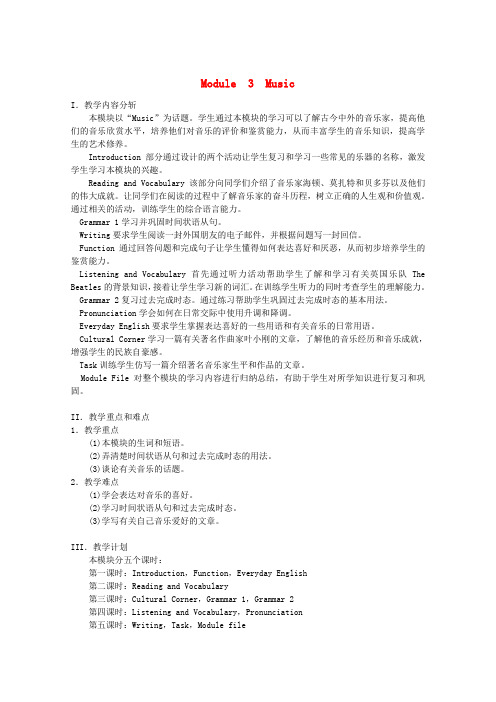
Module 3 MusicI.教学内容分斩本模块以“Music”为话题。
学生通过本模块的学习可以了解古今中外的音乐家,提高他们的音乐欣赏水平,培养他们对音乐的评价和鉴赏能力,从而丰富学生的音乐知识,提高学生的艺术修养。
Introduction部分通过设计的两个活动让学生复习和学习一些常见的乐器的名称,激发学生学习本模块的兴趣。
Reading and Vocabulary该部分向同学们介绍了音乐家海顿、莫扎特和贝多芬以及他们的伟大成就。
让同学们在阅读的过程中了解音乐家的奋斗历程,树立正确的人生观和价值观。
通过相关的活动,训练学生的综合语言能力。
Grammar 1学习并巩固时间状语从句。
Writing要求学生阅读一封外国朋友的电子邮件,并根据问题写一封回信。
Function通过回答问题和完成句子让学生懂得如何表达喜好和厌恶,从而初步培养学生的鉴赏能力。
Listening and Vocabulary首先通过听力活动帮助学生了解和学习有关英国乐队The Beatles的背景知识,接着让学生学习新的词汇。
在训练学生听力的同时考查学生的理解能力。
Grammar 2复习过去完成时态。
通过练习帮助学生巩固过去完成时态的基本用法。
Pronunciation学会如何在日常交际中使用升调和降调。
Everyday English要求学生掌握表达喜好的一些用语和有关音乐的日常用语。
Cultural Corner学习一篇有关著名作曲家叶小刚的文章,了解他的音乐经历和音乐成就,增强学生的民族自豪感。
Task训练学生仿写一篇介绍著名音乐家生平和作品的文章。
Module File对整个模块的学习内容进行归纳总结,有助于学生对所学知识进行复习和巩固。
II.教学重点和难点1.教学重点(1)本模块的生词和短语。
(2)弄清楚时间状语从句和过去完成时态的用法。
(3)谈论有关音乐的话题。
2.教学难点(1)学会表达对音乐的喜好。
(2)学习时间状语从句和过去完成时态。
外研版高中《英语》必修二Module 3 Music
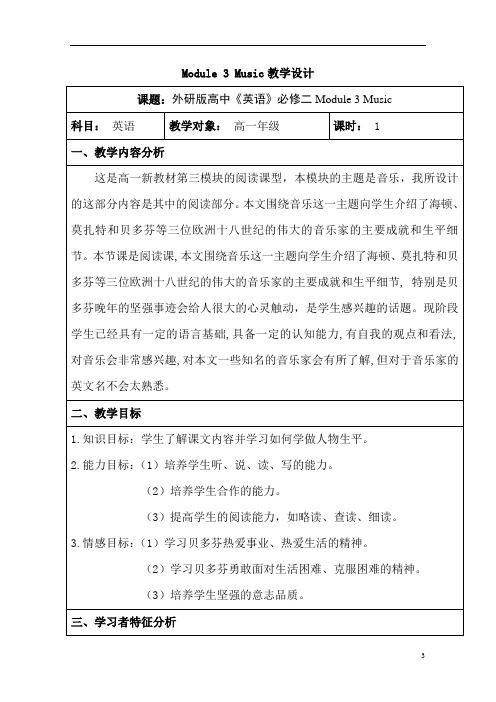
Step1 Warm-up (group work :music show)
What are they doing? What’s the kind of the music? Who is the composer?
Step2 Brainstorming (pictures)
Module 3 Music教学设计
课题:外研版高中《英语》必修二Module 3 Music
科目:英语
教学对象:高一年级
课时:1
一、教学内容分析
这是高一新教材第三模块的阅读课型,本模块的主题是音乐,我所设计的这部分内容是其中的阅读部分。本文围绕音乐这一主题向学生介绍了海顿、莫扎特和贝多芬等三位欧洲十八世纪的伟大的音乐家的主要成就和生平细节。本节课是阅读课,本文围绕音乐这一主题向学生介绍了海顿、莫扎特和贝多芬等三位欧洲十八世纪的伟大的音乐家的主要成就和生平细节, 特别是贝多芬晚年的坚强事迹会给人很大的心灵触动,是学生感兴趣的话题。现阶段学生已经具有一定的语言基础,具备一定的认知能力,有自我的观点和看法,对音乐会非常感兴趣,对本文一些知名的音乐家会有所了解,但对于音乐家的英文名不会太熟悉。
3.Hayden encouraged Beethoven to move to Vienna.( )
4.When Beethoven became completely deaf ,he stopped composing .( )
[教师活动] 指导学生带问题分段阅读
[学生活动] 按要求阅读课文并回答问题。
C. Three Great Child Composers
[教师活动]协助学生指出备选三个标题的不同点,教授学生做此类题目的方法。
外研版高中英语必修二英语Module3MusicSectionⅡ.docx

高中英语学习材料***鼎尚图文理制作***Module 3MusicSection ⅡGrammar语法指南Ⅰ.Adverbial clause of time(时间状语从句)1.由when,while,as引导的时间状语从句(1)when引导的时间状语从句的谓语动词可以是延续性动词,也可以是瞬间动词,有时when表示“就在那时”。
When I lived in the countryside,I used to carry water for him.我住在农村时,常为他挑水。
We were about to leave when he came in.我们就要离开时,他进来了。
(2)while引导的时间状语从句的谓语动词通常是延续性的,并且强调主句和从句的动作同时发生或者相互对应。
While my wife was reading the newspaper,I was watching TV.我妻子看报纸的时候,我在看电视。
(3)as 引导时间状语从句时意为“当……时候;一边……一边”,从句谓语动词的动作通常是延续性的,一般主句动作和从句动作同时发生,有时可译为“随着”。
We always sing as we walk.我们总是边走边唱。
2.由before和after引导的时间状语从句(1)before引导的时间状语从句表示主句动作发生在从句动作之前。
从句不用否定的谓语形式。
从句位于主句之后时,before有时译成“才;就”。
It will be four days before they come back.他们要过四天才能回来。
(2)after表示主句动作发生在从句动作之后,主句和从句的时间关系正好与before相反。
After we had finished the work,we went home.完成工作之后,我们回家了。
3.由till或until引导的时间状语从句一般情况下till和until可以互换,但在强调句型中多用until。
- 1、下载文档前请自行甄别文档内容的完整性,平台不提供额外的编辑、内容补充、找答案等附加服务。
- 2、"仅部分预览"的文档,不可在线预览部分如存在完整性等问题,可反馈申请退款(可完整预览的文档不适用该条件!)。
- 3、如文档侵犯您的权益,请联系客服反馈,我们会尽快为您处理(人工客服工作时间:9:00-18:30)。
高中英语学习材料
(灿若寒星*制作整理)
Module 3Music
Section ⅡGrammar
语法指南
Ⅰ.Adverbial clause of time(时间状语从句)
1.由when,while,as引导的时间状语从句
(1)when引导的时间状语从句的谓语动词可以是延续性动词,也可以是瞬间动词,有时when表示“就在那时”。
When I lived in the countryside,I used to carry water for him.
我住在农村时,常为他挑水。
We were about to leave when he came in.
我们就要离开时,他进来了。
(2)while引导的时间状语从句的谓语动词通常是延续性的,并且强调主句和从句的动作同时发生或者相互对应。
While my wife was reading the newspaper,I was watching TV.
我妻子看报纸的时候,我在看电视。
(3)as 引导时间状语从句时意为“当……时候;一边……一边”,从句谓语动词的动作通常是延续性的,一般主句动作和从句动作同时发生,有时可译为“随着”。
We always sing as we walk.
我们总是边走边唱。
2.由before和after引导的时间状语从句
(1)before引导的时间状语从句表示主句动作发生在从句动作之前。
从句不用否定的谓语形式。
从句位于主句之后时,before有时译成“才;就”。
It will be four days before they come back.
他们要过四天才能回来。
(2)after表示主句动作发生在从句动作之后,主句和从句的时间关系正好与before相反。
After we had finished the work,we went home.
完成工作之后,我们回家了。
3.由till或until引导的时间状语从句
一般情况下till和until可以互换,但在强调句型中多用until。
并且注意:如果主句谓语动词是瞬间动词,则需用其否定形式;如果主句谓语动词是延续性动词,则用其肯定或否定形式均可,但意思不同。
I didn't go to bed until(till) my father came back.
直到父亲回来我才上床睡觉。
I didn't work until he came back.
他回来我才开始工作。
4.由since引导的时间状语从句
since引导的时间状语从句的谓语动词可以是延续性动词,也可以是瞬间动词。
一般从句的谓语动词用一般过去时,主句的谓语动词用现在完成时。
但在“It is+时间段+since从句”句型中,主句可用一般现在时。
It is four years since my sister lived in Beijing.
我妹妹不在北京住有四年了。
I have been in Beijing since you left.
自从你离开以来,我一直在北京。
5.由as soon as,immediately,instantly,the moment,the instant,the minute,no sooner...than 等引导的时间状语从句中,这些连词都表示“一……就……”。
As soon as I reach Canada,I will ring you up.
我一到加拿大,就给你打电话。
The moment I heard the news,I hastened to the spot.
我一听到消息,马上赶到了出事地点。
*hardly(rarely)...when,no sooner...than相当于as soon as。
主句用过去完成时,从句用一般过去时。
当hardly,rarely和no sooner 位于句首时,主句应用倒装语序。
Hardly had I sat down when he stepped in.
我刚坐下他就进来了。
No sooner had the sun shown itself above the horizon than he got out of bed to work.
太阳刚从地平线上升起,他就起床劳动去了。
6.由by the time引导的时间状语从句
一般情况下,如果从句的谓语动词用一般过去时,主句的谓语动词用过去完成时;如果从句的谓语动词用一般现在时,主句的谓语动词用将来完成时。
By the time you came back,I had finished this book.
到你回来时,我已经写完这本书了。
By the time you come here tomorrow,I will have finished this work.
你明天来这儿的时候,我将会完成此工作了。
Ⅱ.The past perfect tense(过去完成时)
1.表示过去某一时间或动作之前已经发生或完成的动作或存在的状态。
句中常用by,before,when,until等词引导时间状语。
它是以过去某一时间为起点,所以过去完成时是一个相对的时态,表示的是“过去的过去”。
只有和过去某时间或某动作相比较时才能用到它。
Most of the guests had left when he arrived at the party.
当他到达聚会时,大多数客人已经离开了。
2.过去完成时还可表示过去某一时刻之前发生的动作或状态持续到过去某个时间或持续下去。
When Jack arrived,he learned Mary had been away for almost an hour.
当杰克到时,他得知玛丽已经离开快一个小时了。
3.用于并列句:一个并列句用的是过去时,如果另一个并列句表示的动作早于过去时这一动作,这时需用过去完成时。
Tom flew home,but his father had already died.
汤姆乘飞机回家,他的父亲却已经去世了。
4.某些动词的过去完成时表示过去未实现的希望、计划或打算。
常用的动词有hope,expect,suppose,think,want,wish等。
They had wanted to help but couldn't get here in time.
他们本来是要来帮忙的,但未能及时赶到。
5.在it was the first time that句型中,that分句的动词常用过去完成时。
It was the first time that he had ever spoken to me in such a tune.
这是他第一次用这样的语调跟我讲话。
提示:用最精练的语言把你当堂掌握的核心知识的精华部分和基本技能的要领部分写下来并进行识记。
Common Progress Please Criticize。
